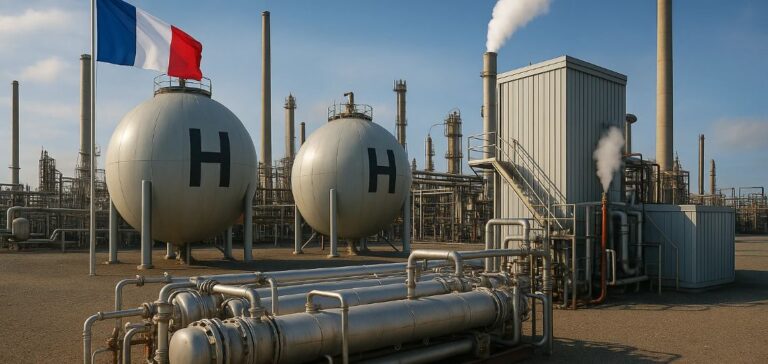The French government has officially downgraded its ambitions for low-carbon hydrogen production for the 2030-2035 period, confirming a delay in meeting its initial targets. The revised strategy, published on Wednesday, now sets a goal of up to 4.5 gigawatts (GW) of installed capacity by 2030 and 8 GW by 2035, down from the previous targets of 6.5 GW and 10 GW respectively. This decision comes in a context of continued low demand and production costs that are still considered too high by sector stakeholders.
Strategy revision and regulatory framework
The Ministry for the Ecological Transition, in coordination with the Ministry for Industry and Energy and the Ministry for Transport, presented the updated strategy during an interministerial innovation committee. The document outlines a smoothing of electrolyser installation targets, citing slower-than-expected technological development. The government justified the changes as necessary to align regulatory frameworks with industrial realities and the pace of market evolution.
Since the publication of the initial hydrogen strategy in 2020, France committed €9bn, partly through the France 2030 investment programme, to establish a national hydrogen sector from scratch, supported by the European Union. The original objective was to decarbonise heavy industry and create an ecosystem for electrolyser manufacturers. To date, more than 150 projects have received funding, aiming to generate 8,000 direct jobs by 2030.
Industry responses and competitiveness challenges
Industrial stakeholders have received the update with a mix of realism and caution. Philippe Boucly, president of France Hydrogène, welcomed the announcement, stating that the revision finally provides a clear operational framework awaited for nearly two years. However, he stressed that the 8 GW target for 2035 should not be treated as a strict upper limit. Matthieu Guesné, CEO of Lhyfe, said the new roadmap would help secure necessary investments, provided that public subsidies are properly deployed.
Some observers expressed stronger criticism. Pierre-Etienne Franc, CEO of hydrogen-focused investment fund Hy24, argued that the government is institutionalising a delay instead of addressing it. He pointed to Spain, which has already approved 1.8 GW in public support, compared to the 200 megawatts expected to be deployed in France this year. According to him, regulatory lag is threatening the competitiveness of heavy industry, where hydrogen remains a key decarbonisation solution.
Keeping these sectors in France will require more dynamic regulation and consistent budgetary commitments to prevent their relocation outside Europe. The sector is calling for clearer support mechanisms and faster administrative decisions to secure the full industrial chain.






















